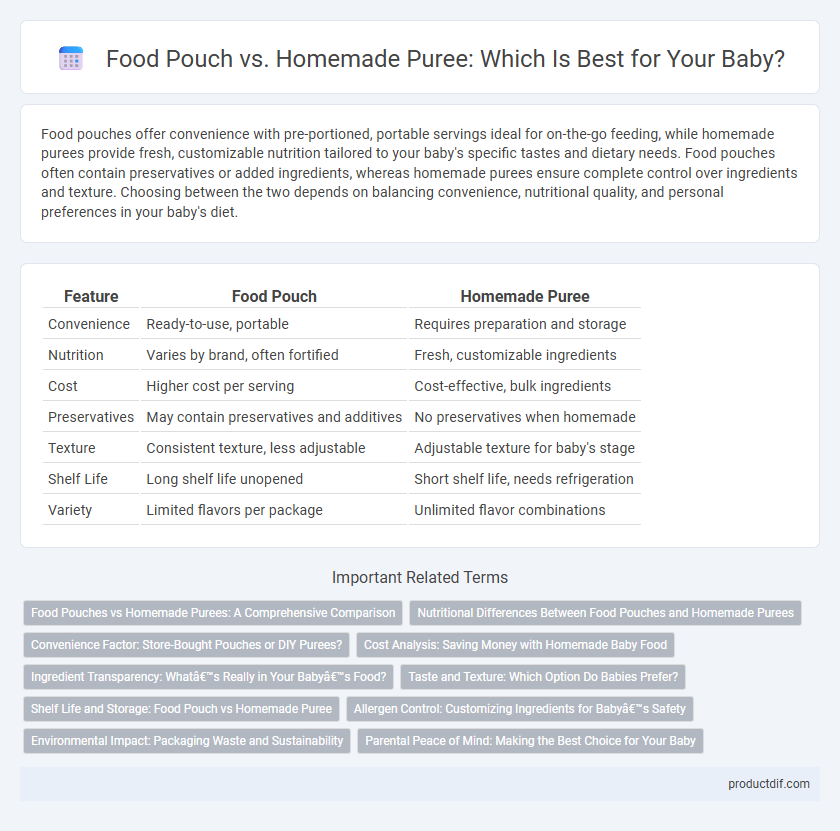Food pouches offer convenience with pre-portioned, portable servings ideal for on-the-go feeding, while homemade purees provide fresh, customizable nutrition tailored to your baby's specific tastes and dietary needs. Food pouches often contain preservatives or added ingredients, whereas homemade purees ensure complete control over ingredients and texture. Choosing between the two depends on balancing convenience, nutritional quality, and personal preferences in your baby's diet.
Table of Comparison
| Feature | Food Pouch | Homemade Puree |
|---|---|---|
| Convenience | Ready-to-use, portable | Requires preparation and storage |
| Nutrition | Varies by brand, often fortified | Fresh, customizable ingredients |
| Cost | Higher cost per serving | Cost-effective, bulk ingredients |
| Preservatives | May contain preservatives and additives | No preservatives when homemade |
| Texture | Consistent texture, less adjustable | Adjustable texture for baby's stage |
| Shelf Life | Long shelf life unopened | Short shelf life, needs refrigeration |
| Variety | Limited flavors per package | Unlimited flavor combinations |
Food Pouches vs Homemade Purees: A Comprehensive Comparison
Food pouches offer convenience and portability, often containing nutrient-rich ingredients with controlled portions that reduce preparation time for busy parents. Homemade purees provide greater control over ingredient quality and texture customization, ensuring fresh, preservative-free meals tailored to a baby's specific dietary needs. Both options support infant nutrition, but food pouches excel in convenience while homemade purees prioritize freshness and ingredient transparency.
Nutritional Differences Between Food Pouches and Homemade Purees
Food pouches often contain added sugars, preservatives, and lower fiber content compared to homemade purees, which preserve natural nutrients and textures. Homemade purees allow precise control over ingredient quality and nutrient density, supporting optimal infant nutrition and development. Nutritional variability in food pouches may affect vitamin and mineral absorption, whereas homemade options consistently deliver fresh, nutrient-rich meals.
Convenience Factor: Store-Bought Pouches or DIY Purees?
Store-bought food pouches offer unmatched convenience with pre-portioned servings and easy portability, making them ideal for busy parents and on-the-go feeding. Homemade purees require time for preparation and storage but allow full control over ingredients and texture customization. Choosing between food pouches and DIY purees depends on balancing time-saving benefits against the desire for personalized nutrition.
Cost Analysis: Saving Money with Homemade Baby Food
Homemade puree significantly reduces expenses compared to store-bought food pouches, offering up to 70% savings per serving by using fresh, seasonal ingredients. Bulk purchasing and preparing larger batches of homemade baby food further drive down costs, eliminating the premium prices of pre-packaged convenience products. Investing time in homemade preparation results in substantial long-term financial benefits, making it a budget-friendly option for families.
Ingredient Transparency: What’s Really in Your Baby’s Food?
Food pouches often contain preservatives, added sugars, and thickeners, making ingredient transparency crucial for informed choices. Homemade purees allow parents full control over fresh, natural ingredients, ensuring no hidden additives compromise baby's nutrition. Understanding labels and sourcing methods helps caregivers prioritize wholesome, transparent feeding options.
Taste and Texture: Which Option Do Babies Prefer?
Food pouches offer a smooth, consistent texture that many babies find easy to eat, while homemade purees can vary in texture, providing a richer sensory experience. Taste-wise, homemade purees allow for fresher, more customized flavors, whereas food pouches often contain added preservatives or sweeteners that may impact baby preferences. Studies show babies tend to prefer the natural taste and varied textures of homemade purees when introduced gradually.
Shelf Life and Storage: Food Pouch vs Homemade Puree
Food pouches offer extended shelf life due to airtight packaging and preservatives, maintaining freshness for several months at room temperature until opened. Homemade purees require refrigeration and typically last only 24 to 48 hours, demanding prompt consumption or freezing for longer storage. Choosing between them depends on convenience and storage preferences, with pouches suited for on-the-go use and purees favored for fresh, preservative-free feeding.
Allergen Control: Customizing Ingredients for Baby’s Safety
Food pouches offer precise control over ingredient selection, reducing exposure to potential allergens by allowing parents to choose hypoallergenic formulations specifically designed for infants. Homemade purees provide flexibility to avoid known allergens by using fresh, natural ingredients tailored to the baby's dietary needs and family allergy history. Both methods enable caregivers to customize meals carefully, ensuring safer introduction of allergens and minimizing adverse reactions in sensitive babies.
Environmental Impact: Packaging Waste and Sustainability
Food pouches generate significant packaging waste due to their single-use plastic composition, contributing to landfill accumulation and environmental pollution. Homemade purees reduce packaging waste substantially by eliminating the need for disposable containers and allowing reuse of kitchen tools. Choosing homemade purees supports sustainability efforts by minimizing plastic consumption and promoting eco-friendly feeding practices.
Parental Peace of Mind: Making the Best Choice for Your Baby
Choosing between food pouches and homemade purees significantly impacts parental peace of mind, with many parents prioritizing safety, nutrition, and convenience. Food pouches offer pre-measured nutrition and consistent quality, while homemade purees allow complete control over ingredients and freshness. Evaluating factors such as ingredient transparency, potential allergens, and preparation time helps parents make the best choice for their baby's health and well-being.
Food Pouch vs Homemade Puree Infographic

 productdif.com
productdif.com